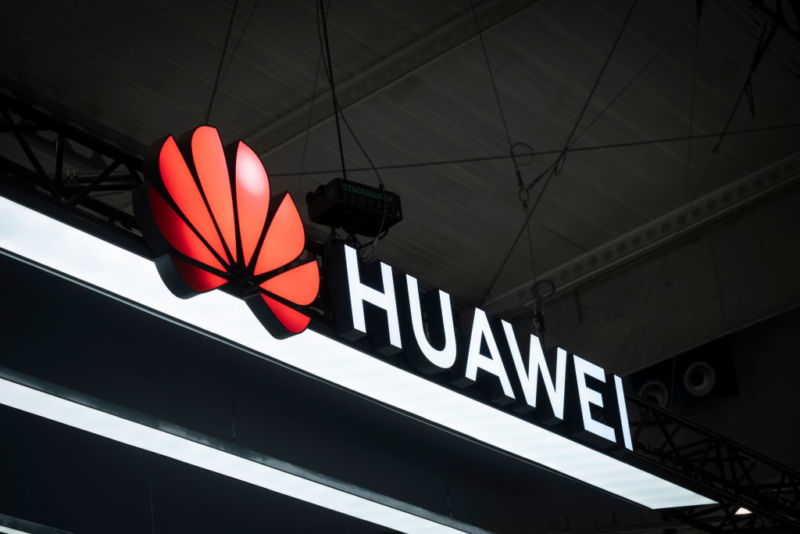Huawei vs. FCC –
Huawei lawsuit seeks to overturn ban on Huawei gear in FCC-funded networks.
Jon Brodkin –)

Enlarge/Huawei’s logo at the Smart City Expo World Congress in Barcelona in November 2019.
Getty Images | SOPA Images
Huawei has sued the Federal Communications Commission over the agency’s order that bans Huawei equipment in certain government-funded telecom projects.
“Huawei asks the court to hold the FCC’s order unlawful on the grounds that it fails to offer Huawei required due process protections in labeling Huawei as a national security threat, “the Chinese company said in apress releaseannouncing the lawsuit. “Huawei believes that the FCC also fails to substantiate its arbitrary findings with evidence or sound reasoning or analysis, in violation of the US Constitution, the Administrative Procedure Act, and other laws.”
Huawei said it filed the complaint in the US Court of Appeals for the Fifth Circuit. We haven’t been able to get a copy of the lawsuit yet.
The FCCvoted unanimously on November 22to ban Huawei and ZTE equipment in projects paid for by the commission’s Universal Service Fund (USF). The order will affect many small telecom providers that rely on the companies’ network gear.
FCC Chairman Ajit Paisaidat the time that Huawei and ZTE were chosen as ban targets because they “have close ties to China’s Communist government and military apparatus. Both companies are subject to Chinese laws broadly obligating them to cooperate with any request from the country’s intelligence services and to keep those requests secret. Both companies have engaged in conduct like intellectual property theft, bribery, and corruption. “
Huawei contended that “Pai and other FCC commissioners failed to present any evidence to prove their claim that Huawei constitutes a security threat and ignored the facts and objections raised by Huawei and rural carriers after the FCC first made the proposal in March 2018. “
Huawei accuses FCC of spreading fear
“These politicians ignore an important fact: Huawei has been working with rural US carriers for many years, and our customers trust our equipment, “Huawei Chief Legal Officer Song Liuping said, according to atranscriptposted by Huawei. “They are experts in the security of their own networks, and they like working with us.”
Pai has “tried to spread fear about Huawei” by “us [ing] words like ‘backdoors’ to scare people But they offer no proof, “Song said.
Song argued that carriers affected by the ban will end up using equipment from Nokia and Ericcson, which aren’t Chinese companies but do “manufacture in China.”
“The US government has never presented real evidence to show that Huawei is a national security threat,” Song said. “That’s because this evidence does not exist. When pushed for facts, they respond that ‘disclosing evidence might also undermine US national security.’ This is complete nonsense. “
Glen Nager, Huawei’s outside counsel,arguedthat the Huawei / ZTE ban “exceeds the FCC’s statutory authority” because ” nothing in the Universal Service provisions of the Communications Act authorizes the Commission to make national security judgments or to restrict use of USF funds based on such judgments. “
The FCC ban will take effect upon being published in the Federal Register and will initially affect future projects paid for by the USF and the use of federal funding to maintain existing equipment. The FCC is also taking public comment on another plan to require removal of Huawei and ZTE equipment from networks that have already been built, and the commission is “seek [ing] comment on how to pay for such removal and replacement.”
Ban will cost small ISPs, Huawei says
Huawei spokesperson Karl Songsaidthat requiring the removal of equipment “would cost hundreds of millions of dollars” for small providers.
“We’ve built networks in places where other vendors would not go. They were too remote, or the terrain was difficult, or there just wasn’t a big enough population, “he said. “In the US, we sell equipment to 40 small wireless and wireline operators. They connect schools, hospitals, farms, homes, community colleges, and emergency services. “
Hoftstra University law professor Julian Ku said that “even a small [Huawei] victory in the case, one that makes the FCC go and start the process over again, would be a huge victory for them, “according to The New York Times. But it may be a difficult case for Huawei to win because US courts usually give federal agencies “a tremendous amount of defense,” Ku said.






GIPHY App Key not set. Please check settings